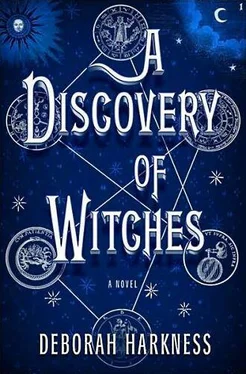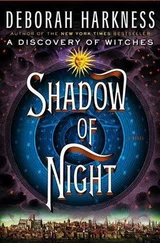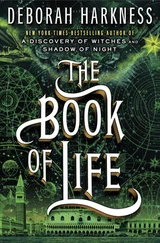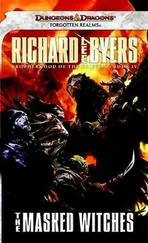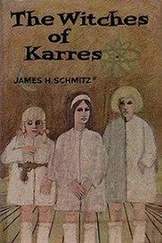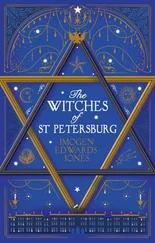“What did qualify?” Matthew picked up my mother’s letter and scanned the last page for further clues.
“The Australian outback. Wyoming. Mali. Those were his favorite places to timewalk.”
The word cut through me with the same intensity as “spellbound” had only a few days before. I knew that some witches could move between past, present, and future, but I’d never thought to ask whether anyone in my own family had the ability. It was rare—almost as rare as witchfire.
“Stephen Proctor could travel in time?” Matthew’s voice assumed the deliberate evenness it often did when magic was mentioned.
Sarah nodded. “Yes. Stephen went to the past or the future at least once a year, usually after the annual anthropologists’ convention in December.”
“There’s something on the back of Rebecca’s letter.” Em bent her neck to see underneath the page.
Matthew quickly flipped it over. “I dropped the page to get you outside before the witchwater broke. I didn’t see this. It’s not your mother’s handwriting,” he said, passing it to me.
The handwriting on the penciled note had elongated loops and spiky peaks. “Remember, Diana: ‘The most beautiful experience we can have is the mysterious. It is the fundamental emotion that stands at the cradle of true art and true science. Whoever does not know it and can no longer wonder, no longer marvel, is as good as dead, and his eyes are dimmed.’” I’ d seen that hand somewhere before. In the recesses of my memory, I flipped through images trying to locate its source but without success.
“Who would have written a quote from Albert Einstein on the back of Mom’s note?” I asked Sarah and Em, angling the page to face them and struck again by its familiarity.
“That looks like your dad. He took calligraphy lessons. Rebecca poked fun at him for it. It made his handwriting look so old-fashioned.”
Slowly I turned the page over, scrutinizing the writing again. It did look nineteenth-century in style, like the handwriting of the clerks employed to compile the catalogs in the Bodleian back during Victoria’s reign. I stiffened, looked more closely at the writing, shook my head.
“No, it’s not possible.” There was no way my father could have been one of those clerks, no way he could have written the nineteenth-century subtitle on Ashmole 782.
But my father could timewalk. And the message from Einstein was unquestionably meant for me. I dropped the page onto the table and put my head in my hands.
Matthew sat next to me and waited. When Sarah made an impatient sound, he silenced her with a decisive gesture. Once my mind stopped spinning, I spoke.
“There were two inscriptions on the first page of the manuscript. One was in ink, written by Elias Ashmole: ‘Anthropologia, or a treatis containing a short description of Man.’ The other was in a different hand, in pencil: ‘in two parts: the first Anatomical, the second Psychological.’”
“The second inscription had to be written much later,” Matthew observed. “There was no such thing as ‘psychology’ during Ashmole’s lifetime.”
“I thought it dated from the nineteenth century.” I pulled my father’s note toward me. “But this makes me think my father wrote it.”
The room fell silent.
“Touch the words,” Sarah finally suggested. “See what else they say.”
My fingers passed lightly over the penciled letters. Images bloomed from the page, of my father in a dark frock coat with wide lapels and a high black cravat, crouched over a desk covered with books. There were other images, too, of him in his study at home wearing his familiar corduroy jacket, scrawling a note with a No. 2 pencil while my mother looked over his shoulder, weeping.
“It was him.” My fingers lifted from the page, shaking visibly.
Matthew took my hand in his. “That’s enough bravery for one day, ma lionne.”
“But your father didn’t remove the chemical wedding from the book at the Bodleian,” mused Em, “so what was he doing there?”
“Stephen Proctor was bewitching Ashmole 782 so that no one but his daughter could call it from the stacks.” Matthew sounded sure.
“So that’s why the spell recognized me. But why didn’t it behave the same way when I recalled it?”
“You didn’t need it. Oh, you wanted it,” Matthew said with a wry smile when I opened my mouth to protest, “but that’s different. Remember, your parents bound your magic so that your power couldn’t be forced from you. The spell on the manuscript was no different.”
“When I first called Ashmole 782, all I needed was to check the next item off my to-do list. It’s hard to believe that something so insignificant could trigger such a reaction.”
“Your mother and father couldn’t have foreseen everything—such as the fact that you would be a historian of alchemy and would regularly work at the Bodleian. Could Rebecca timewalk, too?” Matthew asked Sarah.
“No. It’s rare, of course, and the most adept timewalkers are well versed in witchcraft as well. Without the right spells and precautions, you can easily end up somewhere you don’t want to be, no matter how much power you have.”
“Yes,” Matthew said drily. “I can think of any number of times and places you would want to avoid.”
“Rebecca went with Stephen sometimes, but he had to carry her.” Sarah smiled at Em. “Do you remember Vienna? Stephen decided he was going to take her waltzing. He spent a full year figuring out which bonnet she should wear for the journey.”
“You need three objects from the particular time and place you want to travel back to. They keep you from getting lost,” Em continued. “If you want to go to the future, you have to use witchcraft, because it’s the only way to direct yourself.”
Sarah picked up the picture of the chemical wedding, no longer interested in timewalking. “What’s the unicorn for?”
“Forget the unicorn, Sarah,” I said impatiently. “Daddy couldn’t have wanted me to go back in the past and get the manuscript. What did he think, that I’d timewalk and snatch it before it was bewitched? What if I ran into Matthew by accident? Surely that would mess up the time-space continuum.”
“Oh, relativity.” Sarah’s voice was dismissive. “As an explanation that only goes so far.”
“Stephen always said timewalking was like changing trains,” Em said. “You get off one train, then wait at the station until there’s a place for you on a different train. When you timewalk, you depart from the here and now and you’re held out of time until there’s room for you sometime else.”
“That’s similar to the way vampires change lives,” Matthew mused. “We abandon one life—arrange a death, a disappearance, a change of residence—and look for another one. You’d be amazed at how easily people walk away from their homes, jobs, and families.”
“Surely someone notices that the John Smith they knew last week doesn’t look the same,” I protested.
“That’s even more amazing,” Matthew admitted. “So long as you pick carefully, no one says a word. A few years in the Holy Land, a life- threatening illness, the likelihood of losing an inheritance—all provide excellent excuses for creatures and humans to turn a blind eye.”
“Well, whether it’s possible or not, I can’t timewalk. It wasn’t on the DNA report.”
“Of course you can timewalk. You’ve been doing it since you were a child.” Sarah sounded smug as she discredited Matthew’s scientific findings. “The first time you were three. Your parents were scared to death, the police were called out—it was quite a scene. Four hours later they found you sitting in the kitchen high chair eating a slice of birthday cake. You must have been hungry and gone back to your own birthday party. After that, whenever you disappeared, we figured you were sometime else and you’d turn up. And you disappeared a lot.”
Читать дальше
